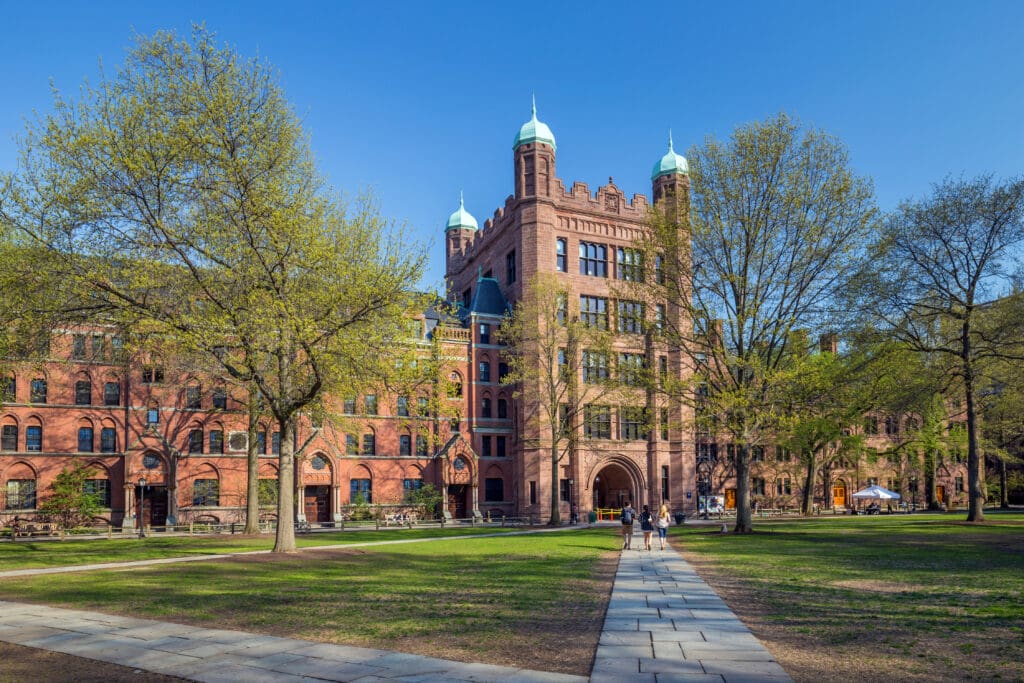
How Yale Hospitality leaned into sustainability to reduce its environmental impact during a recent food hall remodel.
According to the FDA, between 30 and 40 percent of food in the United States goes uneaten – as much as 20 pounds of food per person per month. Americans are tossing out the equivalent of $165 billion in food each year. Universities across the nation are contributing to this dilemma; college campuses nationwide produce 22 million pounds of food waste annually, according to National Resource Defense Council (NRDC). In addition to food that goes uneaten, many universities also face sustainability challenges related to food service equipment, dining furniture and fixtures that require replacement or are in a state of surplus.
The Challenge for Yale Hospitality
Students who attend Yale have high expectations and this includes the campus’ dining facilities, where students spend significant time to eat, study and socialize. Yale has 14 residential dining halls.
Several years ago, Yale was faced with a challenge regarding a surplus with its dining facilities and its food service equipment, which required both liquidation and renovation. Yale liquidated and/or refurbished four different dining hall locations on campus with support from TAGeX, a business equipment liquidator. The project involved the renovation of Commons Dining Hall, a 14,000-square-foot central dining location.
The goal was to transform Commons into a multi-purpose student venue — the Yale Schwarzman Center (YSC). To help fund this renovation, Yale alumnus Stephen A. Schwarzman donated $150 million to create a student center by renovating Commons and Memorial Hall.
This engagement with TAGeX was a “home run.” Alumni were acquiring furniture and sending it to their classmates—buying tables and chairs that were anywhere between 30-60 years old by placing bids on RestaurantEquipment.bid.
In addition to the alumni craze, controlling the end location of Yale Hospitality equipment as a key success in these projects’ sustainability stories. Being able to choose the destiny of your end-of-life furniture contributes to our constant quest to be sustainable. If you just get a construction company, they may be scrappers and make money that way, and they might just trash it all. Who knows what they are going to do with it. You’re more in control of your project this way.
How Technology Created Sustainable Solutions
Yale University selected TAGeX Brands because they could achieve three goals: (1) removal of all equipment from the dining facility to prepare for a major renovation; (2) generate a return on the sale of surplus furniture, fixtures for Yale Hospitality; and (3) provide a route that was environmentally friendly and sustainability conscious.
TAGeX needed to design a comprehensive program that included the following elements:
- Overall Project Management
- Complete Documentation and Inventory Management
- Auction Launch on RestaurantEquipment.bid
- Market and Promotion Actions
- Sales and Collection
- Oversee Loadout
Following the project renovation, Yale Hospitality reduced approximately 2,894 kilograms of carbon dioxide. Given 600 closures or remodeling initiatives each year. TAGeX is able to facilitate the avoidance of 1,771,251 kilograms of carbon dioxide in large food providers (i.e. university dining services).
TAGeX was also able to transition existing equipment at Yale to smaller businesses in the local business community. It’s really important to have these things recycled properly. There are lots of small local establishments that follow these types of auctions. We have well-maintained equipment, and the people that received things were really appreciative.
For example, there was a small business owner who bought some of the surplus equipment, which saved her significant cost-savings on the aftermarket. The restaurant equipment industry, like many others, is struggling with supply chain issues. She wasn’t going to be able to open if she had not gotten the help from TAGeX; she would’ve had to scrap the project. While TAGeX focuses on reuse and waste reduction, the ability to provide social and economic sustainability for large and small businesses is certainly another benefit of this innovative model.
Yale Hospitality can now accommodate thousands of individuals simultaneously and utilized by hundreds of Yale student organizations— undergraduate, graduate, and professional— who will have access to the center’s multi-purpose spaces. Its dining areas will welcome the entire campus with diverse food offerings that will be available late into the night.
Daniel Flynn, Director of Asset Renewal & Planned Projects at Yale Hospitality.
About the Author
Daniel Flynn, is Director of Asset Renewal & Planned Projects at Yale Hospitality. In the past 12 years his efforts in sustainability have made significant impacts on Yale Hospitality. In his role, Flynn oversees services, procedures and processes to ensure efficient operation of equipment and preventative maintenance programs. He develops short-term operational and long-term strategic plans to support Hospitality’s asset renewal projects and supports major repairs, new construction or renovation of facilities and equipment. A chef by trade, Flynn graduated from the Culinary Institute of America’s AOS (Associate in Occupational Studies) program, and earned his Bachelors (BA) at the University of New Haven’s School of Hotel/Restaurant Management.
